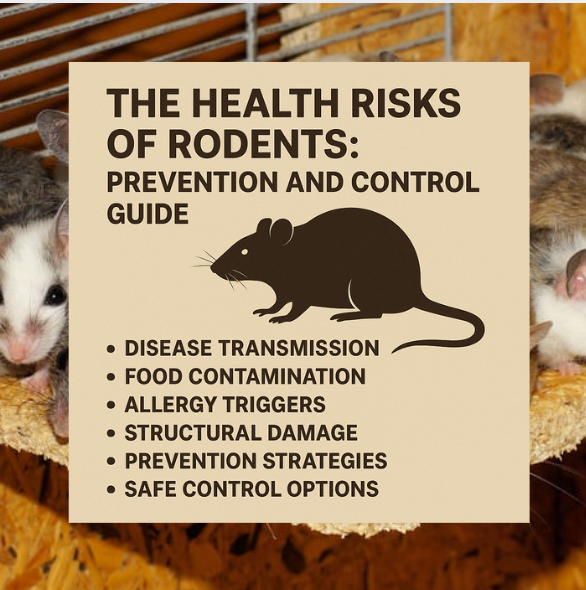THE HEALTH RISKS OF RODENTS: PREVENTION AND CONTROL GUIDE

THE HEALTH RISKS OF RODENTS: PREVENTION AND CONTROL GUIDE
SUMMARY
Rodents are more than just a nuisance—they carry diseases, contaminate food, and damage property. Learn how to identify the health risks rodents pose and discover effective, natural, and professional prevention strategies to keep your home and family safe.
FEATURES
-
Disease Transmission: Rodents spread dangerous illnesses such as Hantavirus, Salmonella, and Leptospirosis.
-
Food Contamination: Rodents contaminate pantries, kitchens, and food storage areas.
-
Allergy Triggers: Rodent droppings and dander can worsen asthma and allergies.
-
Structural Damage: Mice and rats chew wires, insulation, and wood, causing costly repairs.
-
Prevention Strategies: Seal entry points, manage waste, and maintain a clean environment.
-
Safe Control Options: Use natural repellents, traps, or professional pest control when needed.
DESCRIPTION
Rodents are among the most common household pests, but their impact extends far beyond simple annoyance. These small intruders can carry serious health risks, contaminate food, and even threaten the structural integrity of your home. Understanding the dangers they pose and taking steps to prevent infestations is critical for maintaining a safe and healthy living environment.
One of the greatest concerns is disease transmission. Rodents are known carriers of illnesses such as Hantavirus, Salmonella, and Leptospirosis, which can spread to humans through direct contact, droppings, urine, or contaminated food and surfaces. These diseases can cause severe symptoms and, in some cases, life-threatening complications. By keeping rodents away, you reduce the risk of exposure to these harmful pathogens.
Food contamination is another major problem caused by rodents. A single mouse can contaminate large amounts of food with its droppings and urine. Rodents often gnaw through packaging to reach grains, cereals, or pet food, leaving behind unsanitary traces that make the food unsafe to eat. Regularly cleaning pantries, storing food in airtight containers, and promptly disposing of garbage are effective ways to minimize this risk.
In addition to health threats, rodents can worsen respiratory issues. Their droppings, shed fur, and dander can trigger allergies or aggravate asthma symptoms, particularly in children and sensitive individuals. Frequent cleaning, vacuuming, and air filtration can help reduce these allergens if rodents have been present.
Beyond health issues, rodents are notorious for causing structural damage. They chew through wires, insulation, wood, and even plastic piping, creating potential fire hazards and costly repairs. Preventing entry by sealing holes, repairing gaps, and securing foundations can help safeguard your home from this kind of destruction.
Prevention remains the most effective strategy. Simple steps like maintaining cleanliness, eliminating clutter, and managing yard waste go a long way in discouraging infestations. For added protection, natural repellents such as peppermint oil or vinegar can be placed in common entry points. Traps may also be effective for smaller infestations, while professional pest control services are recommended for severe or recurring rodent problems.
By addressing both prevention and safe control methods, homeowners can reduce the risks rodents bring to health and property, ensuring a safer, cleaner living environment.
- Aahna Barma


Comments 0